
Fast
Track will put us on the Wrong Track
Lourdes
Luján wakes each morning to a fetid smell that drifts from the Alamar
River near her house in Colonia Chilpancingo, Tijuana. The river is rank
with raw sewage and industrial wastewater, a byproduct of maquiladoras
operating in the Mesa de Otay Industrial Park, just a few hundred yards
away. During the summer months, the smell becomes almost unbearable. Luján
worries about the health and safety of her children and others who live
and play near the river.
The
toxic pollutants that plague Luján and the residents of Colonia
Chilpancingo are the legacy of U.S. and foreign-owned industries operating
in Mexico under the auspice of the North American Free Trade Agreement.
While the evidence is clear that NAFTA has failed to protect the
environment, President Bush is promoting it as a model for the Free Trade
Area of the Americas (FTAA), which would expand NAFTA to 34 countries and
cover almost all of North, Central and South America.
Metales y Derivados, an abandoned lead smelter in Tijuana, embodies
NAFTA’s failure right here
on the San Diego/Tijuana border. The U.S.-owned maquiladora recycled lead
from car batteries for 12 years before Mexican authorities closed it in
March of 1994 for violations of Mexican environmental law. Approximately
6,000 metric tons of lead slag and other toxic chemicals remain at the
abandoned site, exposed to the elements. The site stands just 600 yards
from Colonia Chilpancingo, home to more than 10,000 people.
Policymakers
hailed NAFTA as the first trade agreement to link trade issues and the
environment. Its green
promises rested on an environmental side agreement that touted enhanced
levels of environmental protection and public participation. This
agreement created the Commission for Environmental Cooperation (CEC), a
tri-national institution comprised of the environmental ministers of
Canada, the United States and Mexico, whose sole purpose is to “…
promote the effective enforcement of environmental law.”
But today, the evidence is clear that the CEC has failed to achieve
its basic mandate.
In October 1998, Environmental Health Coalition and a citizen’s group
from Colonia Chilpancingo filed a petition with the CEC regarding
Mexico’s failure to enforce its environmental laws in the Metales y
Derivados case. In June 2000, the CEC declared that the petition
warranted further investigation and ordered a factual record prepared.
Today, as Chilpancingo residents continue to wait, the CEC “studies”
the case. Even if the CEC determines that the Mexican government failed to
effectively enforce its environmental laws, it cannot force Mexico to
correct the problem.
The
Metales case is not an exception. Since 1995, 30 citizen petitions
have been filed with the CEC. Only two have had factual records prepared.
Half have been dismissed and “action is pending” on the remainder. The
abandoned drums of toxic waste rusting away at the Metales y Derivados
site have come to symbolize NAFTA’s
broken promises.
The Procuraduría Federal de Protección al Ambiente (PROFEPA), the
enforcement arm of the Secretaría de Medio Ambiente y Recursos Naturales
(SEMARNAT), the Mexican equivalent
of the Environmental Protection Agency, last year identified a total of
105 abandoned toxic sites in
Mexico. Of these, 49 are in border states. Seven are in the border zone,
within 62 miles of the U.S.
border. Six of these seven are classified as highly toxic, including Metales
y Derivados.
NAFTA failed to reconcile
the vast differences between the economies and infrastructure of the
United States and Mexico. Now, Mexico alone must shoulder the burden of
irresponsible foreign companies like Metales y Derivados. The parent
company, New Frontier Trading Company, operates comfortably in San Diego
with profits made in Tijuana at the expense of residents and neighboring
communities.
A fundamental flaw of NAFTA lies in how lawmakers negotiated the
agreement. It was struck
behind closed doors with Canadian, U.S. and Mexican trade government
officials and multinational corporations. Environmental and labor
interests were not represented. Fast Track negotiating authority
facilitated the deal, giving a President free reign to sign trade
agreements with other governments. Congress has only limited time to
consider the agreements and cannot amend them before voting.
The
most recent attempt at fast track legislation is the Thomas Bill (H.R.
3005). This bill seeks to
grant the Executive Trade Promotion Authority (TPA), which President Bush
wants in order to negotiate the FTAA without being hampered by public
input.
EHC
participated in a rally and press conference on Monday, Oct. 21, organized
by the San Diego-Imperial Counties Labor Council where a coalition of
labor, environmental groups, working people and community members called
upon Congresswoman Susan
Davis to vote “no” on fast track. Many EHC members have communicated
with the Congresswoman urging her to consider the negative impacts that
fast track legislation would have on labor and the environment.
The congresswoman remained undecided as of the time of this writing
but pledged to sincerely evaluate the information.
The fate of HR3005 might be decided very soon. The President claims that
fast track authority goes hand in hand with fighting terrorism, but this
is simply an opportunistic attempt to exploit the current situation and
the nation’s newfound sense of unity.
EHC
once again calls on all members of the San Diego Congressional delegation
to say “no” to the proposed Fast Track bill. It takes us backward, not
forward, at a time when our nation needs to focus on national security and
the economy.
